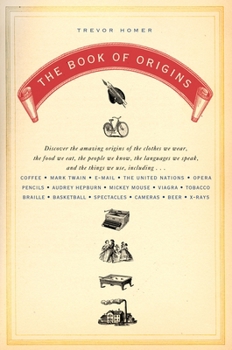The Book of Origins: Discover the Amazing Origins of the Clothes We Wear, the Food We Eat, the People We Know, the Languages We Speak, and
Select Format
Select Condition 
Book Overview
Everything--from the mundane (the pencil) to the catastrophic (the atom bomb)--has an origin, but often it's not what we expect. A few things you may not have known: - Gandhi was married at age thirteen - Chinese fortune cookies are an American invention and were not eaten in China until the 1990s when they were advertised as "Genuine American Fortune Cookies." - Bayer lost the trademark for aspirin (which they had held since 1897) as part of the reparations Germany was forced to pay after World War I. - The original idea for the electric chair came from an American dentist. For aspiring mindblowers and wanna-be know-it-alls, The Book of Origins is a treasure trove of trivia and fascinating facts guaranteed to entertain and enlighten.
Format:Paperback
Language:English
ISBN:0452288320
ISBN13:9780452288324
Release Date:May 2007
Publisher:Plume Books
Length:320 Pages
Weight:0.60 lbs.
Dimensions:0.7" x 5.4" x 8.0"
Age Range:18 years and up
Grade Range:Postsecondary and higher
Customer Reviews
2 ratings
A Great Gift Book For Trivia Lovers
Published by Thriftbooks.com User , 15 years ago
If you love pub quizzes and trivia, you'll love this book of 'firsts'. It's crammed with surprising and intriguing facts about when things started. It's the perfect gift book - everything is written in short sections so that it can be picked up and put down if you're pressed for time. It's a treasure trove of information on the origins of everything - from musical instruments to mobile phones, from toasters to trainspotting, and from pistols to plastic surgery.
Good read especially for trivia buffs
Published by Thriftbooks.com User , 16 years ago
This is a nice sound-byte, bonbon sort of volume on everything under the sun that the author thought relevant arranged alphabetically from Art to Zoos. Herein one discovers that "The consumer is not a moron, she's your wife" (quoting David Ogilvy on page 176), or that Margaret Thatcher was a research chemist who developed soft ice cream, or that Dustin Hoffman was a janitor and an attendant in a mental hospital before he was an actor. There are subsections under each main head. For example, under the chapter heading "Health" we find "History of Medicine," "Diseases and Cures," "Ears," "Eyes," "Heart," etc. Under "Space" there's "Early Astronomy," "Rocket Science," "Conspiracies and Myths" in which we learn that in a 1995 Time Magazine poll "6 percent of Americans do not believe men ever went to the moon." There's even a chapter on "Questionable Origins" in which it is averred that John Dunlap did not invent the pneumatic tire nor did Edison invent the electric light bulb. Sir Humphry Davy (1778-1829) did. Notice the dates after the Davy's name. Homer give dates for all the people named throughout the book, which is a nice old-fashioned touch that I like. I like to stop and think about how long each person lived and get a kind of rough running average, and maybe compare longevity by profession or field of work. Philosophers for example, live a long time, I've discovered, compared to athletes. Now for a bit of criticism. By the way, Homer and his editors anticipate in the epilogue that there will be "corrections and fresh information" from readers and invite them to email the author on his Website or to write the publisher, Plume Books. You might have some corrections of your own. Under the subhead "Poetry and Literature" there's no mention of literature from the subcontinent of India although many other kinds of literature, Arabian, Korean, Irish, etc. are mentioned. It is claimed on page 132 that smallpox has been eradicated. Would that it were true! Homer should have mentioned that both the US and Russia have supplies of the virus in cold storage as a kind of remnant of the Cold War. Both sides say they keep the virus for research in case the other side develops a smallpox bio-weapon. It is claimed on page 133 that Louis Pasteur (1822-95) eliminated the microbe that causes pebrine, a disease of the silkworm. Google "pebrine" and you can see that the microbe is alive and well. Perhaps Homer meant by "eliminating" something more local. I think Homer gives undue credit to the "rigid stances" taken by Margaret Thatcher (b. 1935) and Ronald Reagan (1911-2004) for the breakup of the Soviet Union. This is one of my pet peeves. Communism in Russia fell because it could not compete economically with the Western countries; and the attrition that brought it down (the Cold War) began after World War II and was a continuing policy of the US and Britain. Thatcher and Reagan were merely belated and small parts of the great struggle. So






